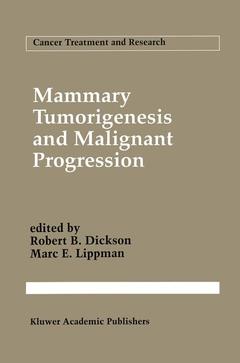Description
Mammary Tumorigenesis and Malignant Progression, Softcover reprint of the original 1st ed. 1994
Advances in Cellular and Molecular Biology of Breast Cancer
Cancer Treatment and Research Series, Vol. 71
Coordinators: Dickson Robert B., Lippman Marc E.
Language: English
Subject for Mammary Tumorigenesis and Malignant Progression:
Publication date: 10-2012
361 p. · 15.5x23.5 cm · Paperback
361 p. · 15.5x23.5 cm · Paperback
Description
/li>Contents
/li>
The current volume represents the fourth over a period of five years in our series on Advances in the Cellular and Molecular Biology of Breast Cancer. The first three volumes were entitled Breast Cancer: Cellular and Molecular Biology, Regulatory Mechanisms in Breast Cancer, and Genes, Oncogenes, and Hormones, respectively. Throughout this series, we have tried to take a broad look at cutting-edge topics in basic science research into breast cancer. This attempt has resulted in a wide range of subject material, including rodent and human model systems, oncogenes, suppressor genes, growth factors, hormones, tumor-host interactions, and determinants of metastases. Since our last volume, research in breast cancer has continued to proceed at an explosive rate. We hope the current volume will provide the reader with some of the excitement felt by the editors and authors as we begin to understand this all-too-common disease. The first section of this book is devoted to the basic processes of proli feration, differentiation, and malignant progression of breast cancer. T.l. Anderson and W.R. Miller lead off with a detailed description of controls on proliferation in the normal human breast and in breast cancer. This chapter strongly emphasizes pathological aspects. The second chapter, by M.R. Stampfer and P. Yaswen, presents a corresponding viewpoint through a presentation of experiments with human mammary epithelial cells in culture. The second section of the book emphasizes the genetic basis for breast cancer onset and malignant progression. Chapter 3, by M.-C. King and S.
I. Proliferation, Differentiation, and Malignant Progression.- 1. Morphological and biological observations relating to the development and progression of breast cancer.- 2. Growth, differentiation, and transformation of human mammary epithelial cells in culture.- II. Genetic Basis for Cancer Onset and Progression.- 3. Genetic analysis of breast and ovarian cancer in families.- 4. The p53 tumor-suppressor gene in human breast cancer.- 5. Tumor-suppressor genes in breast cancer progression.- 6. Estrogen receptor variants in breast cancer.- 7. Hormone ‘resistance’ in breast cancer: the role of normal and mutant steroid receptors.- III. Growth Factors, Receptors, and Polyamines.- 8. The epidermal growth factor family in the mammary gland and other target organs for ovarian steroids.- 9. Molecular and clinical aspects of the Neu/ErbB-2 receptor tyrosine kinase.- 10. MDGF1: a multifunctional growth factor in human milk and human breast cancer.- 11. The role of polyamines in the hormonal control of breast cancer cell proliferation.- IV. Cancer Cell Adhesion, Migration, and Proteolysis.- 12. Modulations of the epithelial phenotype during embryogenesis and cancer progression.- 13. Cell-cell adhesion in invasion and metastasis of carcinomas.- 14. Enhancement of tumor growth by basement membrane: modulation of growth and angiogenesis by laminin-derived synthetic peptides.- 15. Fetal-like fibroblasts: their production of migration-stimulating factor and role in tumor progression.- 16. Urokinase plasminogen activator (uPA) and its type inhibitor (PAI-1): regulators of proteolysis during cancer invasion and prognostic parameters in breast cancer.- V. Rodent Model Systems of Breast Cancer.- 17. Molecular mechanisms of chemical carcinogenesis in rodent models.- 18. Fgf-3, anoncogene in murine breast cancer.
© 2024 LAVOISIER S.A.S.
These books may interest you

Regulatory Mechanisms in Breast CancerAdvances in Cellular and Molecular Biology of Breast Cancer 210.99 €

Endocrinology of Breast Cancer 116.04 €


